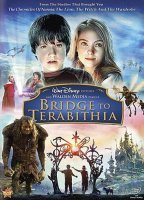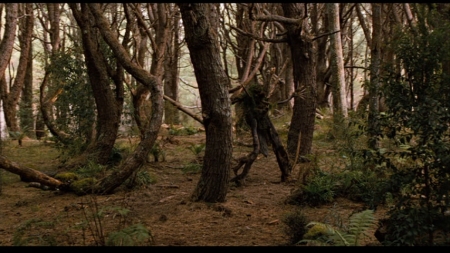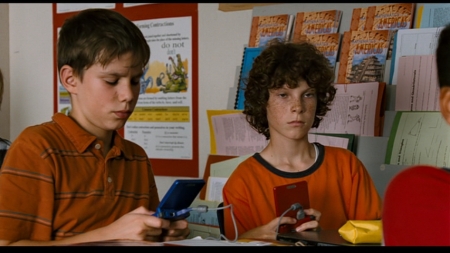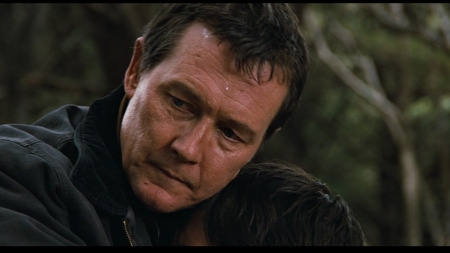
BUY IT AT AMAZON: CLICK HERE!
STUDIO: Disney
MSRP: $29.99
RATED: PG
RUNNING TIME: 96 Minutes
SPECIAL FEATURES:
• Commentary w/ director, writer, producer
• Commentary w/ cast and producer
• "Making-of" production featurette
• "Making-of" book adaptation featurette
• "Keep Your Mind Wide Open" music video
The Pitch
"It’s like My Girl meets Pan’s Labyrinth! Emotionally devestating for adults and children!"
The Humans
Adorable AnnaSophia Robb, capable Josh Hutcherson, Robert Patrick, and one of my many blue-eyed/brunette crushes: Zooey Deschanel.
The Nutshell
Two outcast middle-schoolers form a friendship over their shared love of escapism. Together, they build a fort deep in the woods, and name the land around it Terabithia. In their fancies, they populate Terabithia with all manner of monsters, good and evil, and for a while they are happy. But children aren’t meant to be happy, and no one can escape the weight of real life forever.
The Lowdown
I wasn’t exposed to the novel on which this movie is based, though I did encounter a number of its peers in my youth. Tuck Everlasting, and A Little Princess, and that one story about a girl who kisses her elbow and her little toy lamb dies, and more; stories that were about how great friendship can be, until it turns out that one of the friends has to move, or has cancer, or chokes on a chicken bone, or is murdered by her psychotic uncle, or Germans. Feel good stories, y’know. The kind of ones that win Newberry awards and have fewer lasers than I prefer to talk about in polite company.

He’s not drawing gum, Violet. You wouldn’t be interested.
As a child, I didn’t really get into those books; I preferred my fantasy devoid of the harsh lessons of life, unless they were extraordinarily violent lessons, like those found in Grimm folktales. So, by dint of effort I missed out on Bridge to Terabithia. Now, I’m kind of glad I did, because as a significantly-less-mature-than-average child, I couldn’t have appreciated it nearly as much as I do as an adult (who happens to wish from time-to-time he could return to being eight years old and less-mature-than-average.)
What I mean to say is that when I was a child I thought as a child, I spoke as I child, I ate mud as a child; but now that I am a man I have cut mud from my diet.
If you avoided getting close to Bridge to Terabithia because it was produced by the Narnia-loving folks at Walden Media, then you’ve done yourself a disservice. This is not Narnia. Narnia is dull, and has characters who have destinies. Destinies are the worst things to happen to fantasy fiction. Emotionless vectors stumble through close-enough-to-allergory plotting. Okay, Lucy is adorable, but that’s it. Bridge to Terabithia, on the other hand, is a quiet, focused character story about how and how not to escape from those things that seem to trouble your life.
That doesn’t tend to get butts in the seats, but the seats deserve to be filled. Terabithia holds story that is effortlessly charming, and has more in common with a cautionary tale than the hollow adventures that too often plague children’s entertainment.

We are the Hollow Men.
There’s something about those hollow adventures, though, that justifiably attracts an audience: the romance. The experiences that tower over life, reducing all the spare histories of the characters to build-up to moments of glory. That’s escapism, the sympathetic pursuit of something wholly other from what you have been so far. In Bridge to Terabithia, the escapism is much less grand: for the characters, it’s in order to create spaces for themselves in a world prepared to make room for them, anyway; for the audience, it’s only as far as the distance to their nearest memory of childhood. There are monsters in the real lives of the children, sure, but there is no danger, no need for escape so vital as that which visited Ofelia in Pan’s Labyrinth.
Therein lie both Terabithia‘s charm and power. It’s not a film to provide the audience with escape — not as the marketing campaign led people to believe. It’s a simple, relatable story about the need to balance fantasy and reality, with no impetus to do so other than the small crying for such somewhere deep in the "heart" region of the brain. It’s not hard to find an audience that craves escape; what may be difficult is bringing them to a place where they feel like turning a gentle, chiding look inward as the story skirts a condemnation of the selfishness evident in escape.

Ain’t nothing wrong with escaping the rigors of daily life.
That’s what I see as dividing audiences exposed to Terabithia. Not only does it set up the expectation of an adventure, for those unfamiliar with the book, but its own structure plays into the same line for three-quarters of the running time. Then comes the turn, the imprint of the cautionary tale. Jess, the little boy, makes a very selfish decision, driven by fantasy of a different type, and he is punished for it. I’ve gone on record before as being awfully fond of those stories in which cruel fates beat the hell out of a kid who has made a bad decision. It’s a fine literary tradition.
Well, it doesn’t manifest quite like that in Terabithia, and I’m actually glad for it. The scenario with which Jess’ life gets rent is as short on romance as the film’s approach to escapism. It’s something imaginable, relatable. He made a choice, and while his choice didn’t directly cause the pain that comes calling, he is responsible for the masochism it brings.
Rather than finishing on such a downer, Terabithia manages to return to its own balance between reality and fantasy, and I’m glad for it. Jess, as a character, makes no colossal mistakes. He doesn’t deserve punishment greater than his crime. Without spoiling too much for those who like to coax out a little saline, I’ll say that I think the ending carries much sweeter a moral than its young adult fantasy peers, excepting maybe Alfonso Cuaron’s version of A Little Princess.
I’m a big, soppy mess, but I’m nearly as fond as what Bridge to Terabithia has to say about the necessity of the mind’s ability to create worlds for itself as I am of Pan’s Labyrinth, though by no means are the two slated for the same audience.

Need a man with a tough exterior and a gooey core of molten metal? This is your guy.
The Package
Two commentaries are inculded for your edification. The first is a thoughtful, though reserved, bit of technical and critical examination via director Gabor Csupo, writer Jeff Stockwell, and producer Hal Lieberman. The other is a much more lively selection, featuring the two child actors Ms. Robb and Mr. Hutcherson, alongside producer Lauren Levine.
There are also two behind-the-scenes featurettes, one focused on special effects, location scouting, and general pretty things; the other on the translation of the book to the screen, and the filmmakers’ acknowledgement of what was important and worth preserving from the text.
Finally, AnnaSophia Robb has a music video, because that’s what Disney princesses do these days. It’s for the song "Keep Your Mind Wide Open," which I don’t remember.